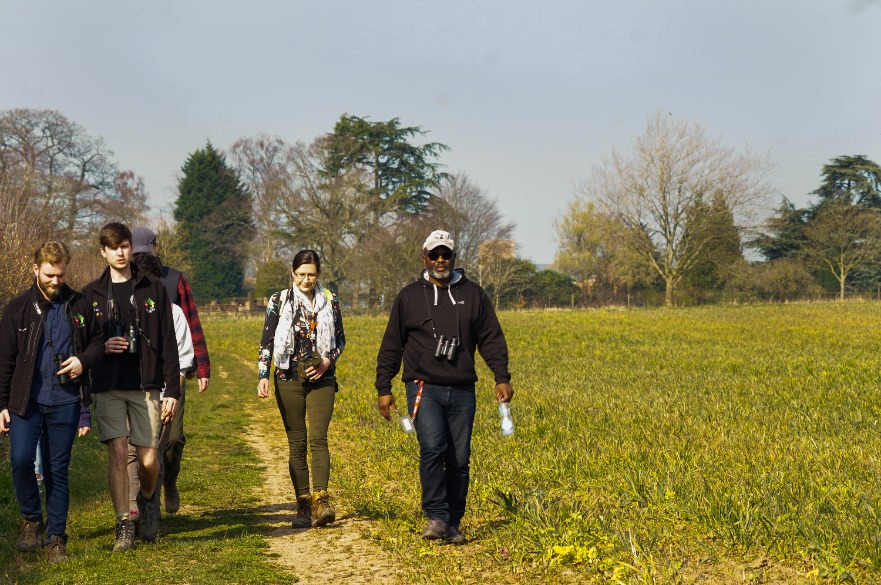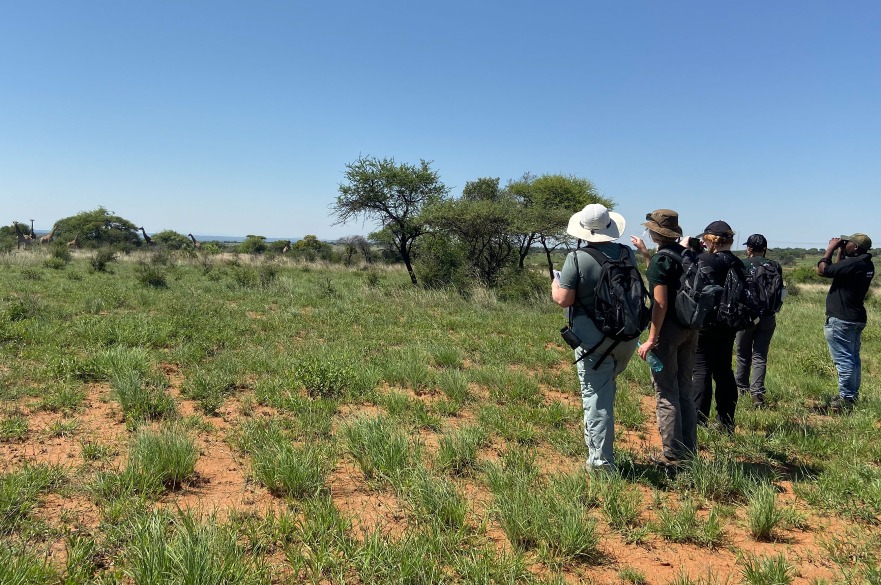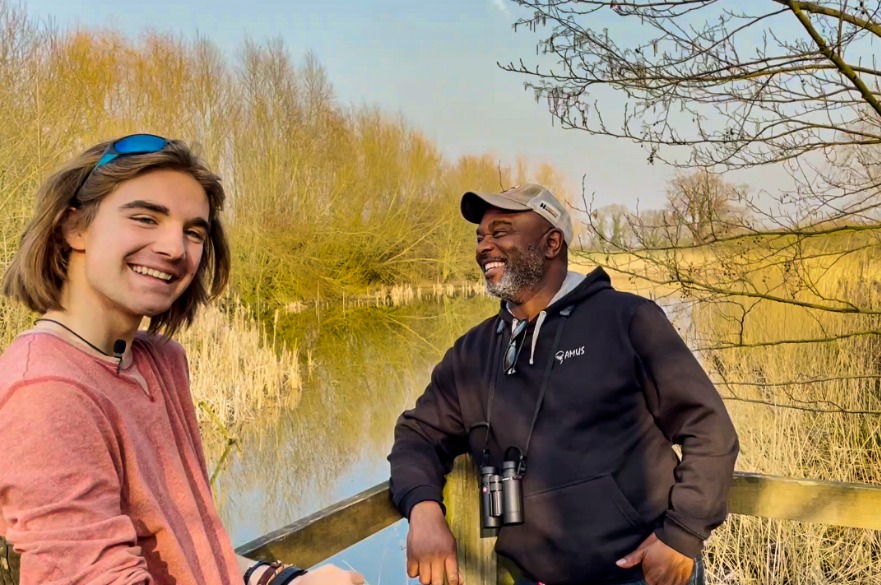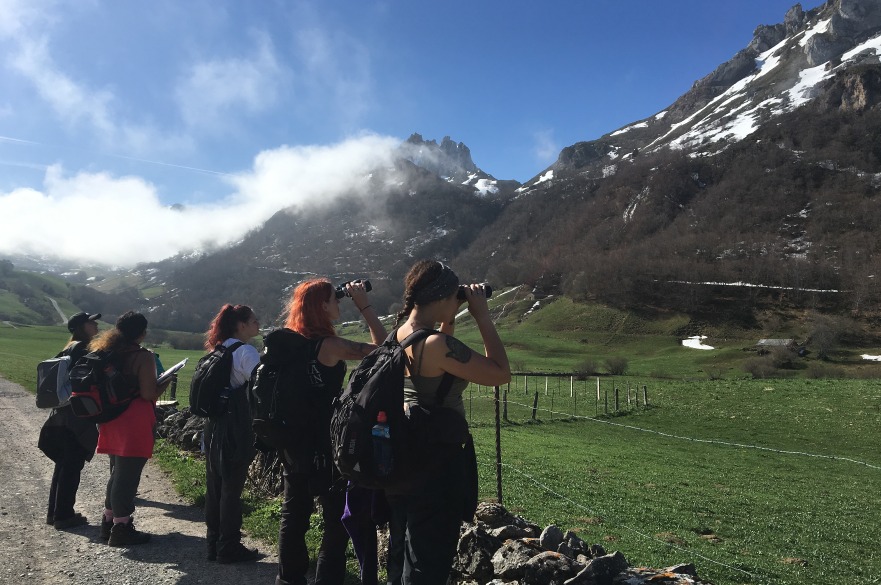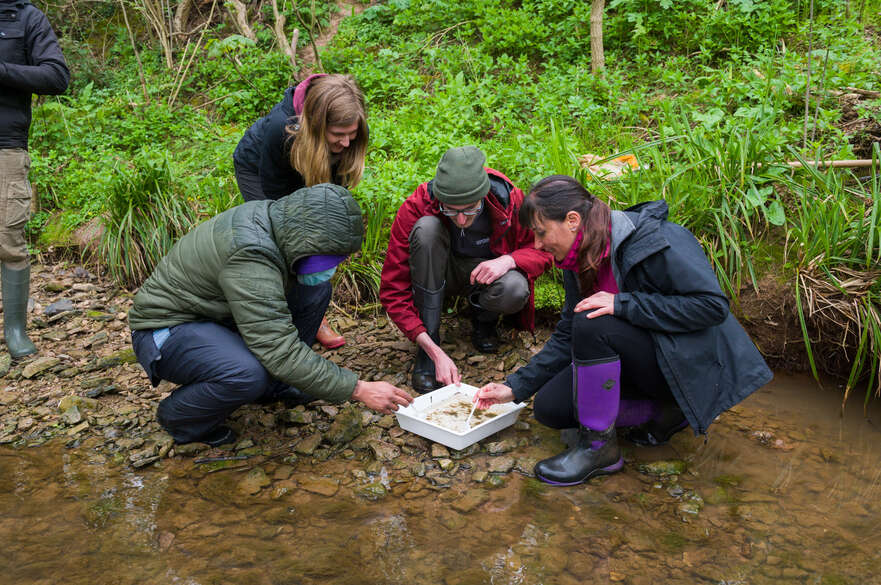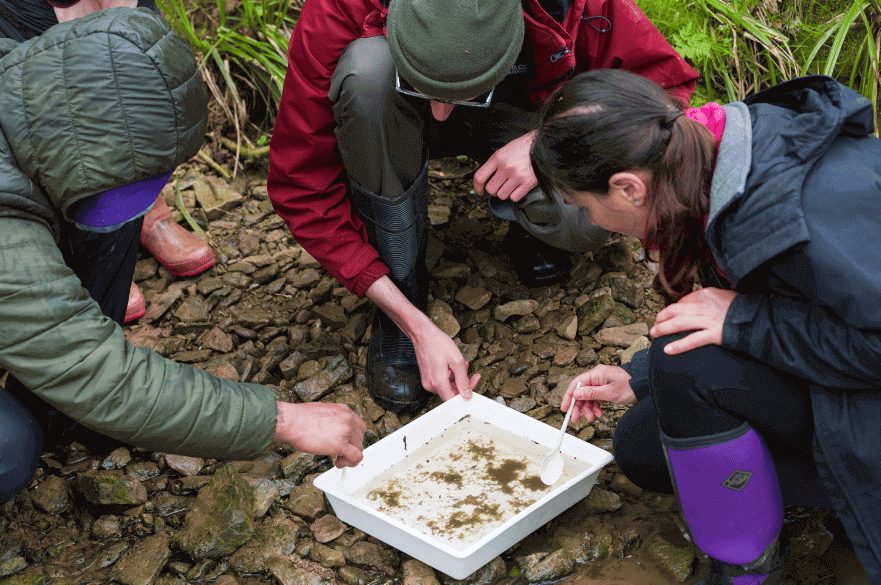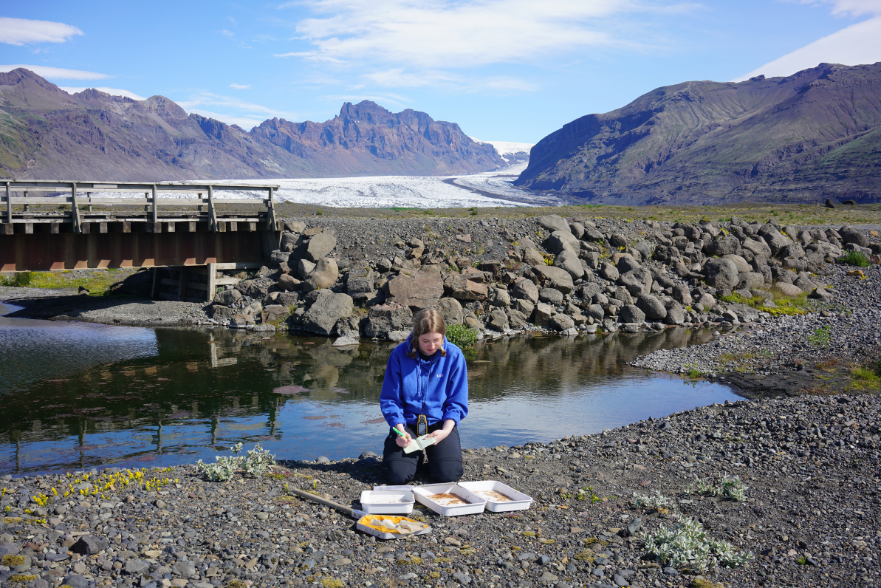This course is in Clearing
Offers from 56 tariff points
About this course
This course is an integrated foundation degree, where you'll progress onto our BSc (Hons) Wildlife Conservation course, once you successfully complete your foundation year.
Our integrated foundation degrees offer a unique gateway to our BSc courses for those who currently don't meet the degree-level entry criteria. The foundation year acts as a launch pad, supporting you with the transition to university learning. Anticipate a year filled with the development of robust study skills, increased confidence in tackling intricate problems, and the cultivation of independent learning. Rest assured, by the end of this transformative year, you'll emerge well-prepared for the exhilarating challenges that await you at degree level.
About the BSc course
You will learn about the theory and practice of species conservation through a range of lectures, practicals and fieldwork combining the scientific principles of animal function and behaviour with conservation biology. You’ll explore current areas of global concern, including the effects of habitat loss on wild species, alongside approaches to their conservation. This course will give you sound knowledge of ecological processes and theories while developing the skills to identify, monitor and manage wild animals and their habitats.
Our 200-hectare rural campus offers a unique learning environment where you will put theory into practice and gain hands-on ecology and conservation experience. We utilise this outdoor classroom in many of our modules, for example, by undertaking species and habitat surveys across the campus. You will be taught by lecturers that have vast experience in the conservation sector and in ecological research.
Throughout the course, you will have the chance to participate in exciting field courses. Previous examples of trips include South Africa, southern Spain and Pembrokeshire, looking at the unique biodiversity of savannah, montane and coastal ecosystems, respectively.
You will also experience a range of non-residential field trips to various local and national sites of importance to nature. For example, previous first year trips have included studying the behaviour of British wildlife such as red deer and grey seals; as well as exotic animals such as Barbary macaques.
You will have the opportunity to undertake a year-long industry sandwich placement in the conservation sector between your third and final year, providing an excellent opportunity to explore an aspect of ecology or conservation that interests you while increasing your employability prospects.
Which course is right for you?
We offer two conservation degrees, each with a different focus:
- BSc (Hons) Ecology and Conservation - explores community and ecosystem ecology (i.e. larger scale ecology) and has more of a focus on habitats, plants, land use and the habitat requirements of species.
- BSc (Hons) Wildlife Conservation / BSc (Hons) Wildlife Conservation (with foundation year) (this course) - explores behavioural and population ecology (i.e. smaller scale ecology) and has more of a focus on wild animal species and animal conservation management, both in the UK and overseas.
We also offer BSc (Hons) Zoology / BSc (Hons) Zoology (with foundation year).
What you’ll study
During your foundation year, you'll gain a strong scientific foundation, core study skills, and the confidence for independent learning.
As part of your degree-level study, you will undertake a range of modules that will equip you with the skills and understanding of ecological processes, wildlife management and conservation biology. You will gain an understanding of broad ecological aspects and key industry-standard skills to identify, monitor and manage wild animals and their habitats, which are crucial for a career in wildlife conservation. Throughout the course, you will also gain key transferable skills, such as professional writing, critical thinking, time management and teamwork.
Each year of your degree course consists of 120 credits spread over at least five modules (see below), including optional modules in your final year. During your final year, you will also have the opportunity to conduct independent dissertation research on a topic of your interest with the one-to-one support of our lecturers.
Your lectures will cover topics such as:
- Anatomy and physiology
- Behaviour
- Conservation biology
- Wildlife surveying
- Habitat management.
This is your foundation year. You'll study five modules and there's a detailed breakdown of what's included in each below.
Foundation Biology (20 credits)
Study fundamental biological concepts across various areas. You'll explore topics including the characteristics of living organisms, classification and taxonomy, cell structure, microbiology, genetics, and biological systems.
Laboratory Skills (20 credits)
Gain essential laboratory skills for biological and environmental sciences. Emphasizing good laboratory practice, health and safety, and key techniques like weighing, dilution, titration, and microscopy, you'll develop proficiency in recording, evaluating, and presenting laboratory findings.
Science in Practice (20 credits)
Learn cross-disciplinary scientific application skills. Utilizing case studies, you'll explore how scientific principles address real-world problems in various sectors. Topics encompass sustainability, including the identification of the 17 Sustainable Development Goals (SDGs), data presentation and interpretation, and positive actions to mitigate human impact on ecosystems.
Field Skills (20 credits)
Gain technical and practical field skills. Through practical classes on the campus estate and at other locations, you'll explore fieldwork safety and risk assessment, as well as key techniques like map reading, plant and animal identification, and environmental analysis. Additionally, you'll also look at data collection in the field and report writing for fieldwork.
Preparing for Success (40 credits)
Explore your personal values and look at the human, social and emotional aspects of professional learning to support your transition to studying at degree-level. Via problem-based and experiential learning, you'll explore note-taking, Virtual Learning Environment usage, time management, assessment interpretation, exam techniques, professional communication, scientific write-ups, citation and referencing, and presentation skills.
From Year Two onwards, you'll study the modules of the degree course.
Animal Structure, Function and Adaptation (20 credits)
Explore animal anatomy and physiology across a range of species. You'll delve into cellular biology, genetic processes, survival strategies and how animals adapt to environmental challenges in various ecosystems.
Behaviour (20 credits)
Study the fascinating world of animal behaviour including learning, communication, social structures and sexual behaviour. Previously, this module has included trips to undertake observations of wild grey seals at Donna Nook National Nature Reserve in Lincolnshire and free-roaming Barbary macaques at Trentham Monkey Forest.
Biodiversity Conservation (20 credits)
Explore the amazing array of biological diversity on Earth, focusing on the abundance and distribution of species. Investigate theories addressing evolution, the causes of mass extinctions, and the conservation of species through a series of lectures and practical sessions including owl pellet dissections.
Conservation Organisations and Wildlife Issues (20 credits)
Through lectures, class debate and personal investigation, you will research the work that organisations undertake in response to managing current national and international wildlife conservation issues. Issues include the impact of agricultural pesticide use on pollinators and the impact of the badger cull in response to controlling bovine tuberculosis.
Ecological Census Techniques (20 credits)
Study how to identify plants and animals, and plan and conduct field surveys to monitor species and habitats. You will learn about the principles of surveying techniques before conducting your own field-based surveys across Brackenhurst Campus, including camera trapping, small mammal surveys, breeding bird surveys, and Phase 1 habitat surveys. These field skills are crucial for roles across the conservation sector.
Principles of Ecology (20 credits)
Examine the interactions between organisms and their environment, at individual, population, community and ecosystem levels. Investigate the abiotic (non-living) and biotic (living) factors driving population and community dynamics through a series of lectures and practical sessions undertaken on the Brackenhurst Campus.
Applied Habitat Management (20 credits)
Understand the ecology and habitat management of a range of the most important UK habitats via site-based evaluations. You will also learn how to create a conservation management plan, which is a key skill required when working in the conservation sector.
Behavioural and Evolutionary Ecology (20 credits)
Explore the way in which animals behave in relation to their environment. Study areas such as the selfish gene, optimal foraging, game theory, and sexual selection.
Introduction to Research (20 credits)
Explore the principles of research methods in biological sciences, focusing on data collection, analysis, and interpretation. You'll look at experimental design, literature evaluation and hypothesis testing, preparing you for undertaking independent research as part of your final year dissertation.
Wildlife Field Techniques and Geographical Information Systems (GIS) (20 credits)
Working collaboratively with your peers, you will build on previous knowledge to develop and employ a range of field techniques used in assessing the status of wildlife. In addition, you will hone your data acquisition, processing and GIS skills through a series of activities carried out on Brackenhurst Campus and as part of a residential field course. Previously, this trip has visited Spain.
Law and Policy (20 credits)
You will be introduced to the past, present and future laws and policies relating to the environment, wildlife and conservation. You will look at a range of specific wildlife and environmental laws, the reasons that we need them, the ways in which they work, and, finally, evaluate whether they are working to protect nature and natural resources.
Wildlife Population Biology (20 credits)
Develop your understanding of the dynamics at play within wildlife populations. You will critique the contrasting theories of population density, explore how the principles of inheritance can be applied to captive breeding programmes, and look at how knowledge of transmission can inform control of diseases in wildlife populations.
This is a placement year for students on the sandwich course.
Conservation Ecology (20 credits)
Learn the way ecological theory can be applied to the conservation of terrestrial, freshwater, marine and transitional environments. Integrate learning to understand the magnitude of conservation challenges, and how these might be resolved.
Dissertation (40 credits)
Undertake an independent research project under the supervision of our experienced staff. Focus on an area of conservation that interests you and allows you to use your practical and/or research skills to help you shape the focus of your degree.
Wildlife Management (20 credits)
Use real-world case studies to examine the suitability of different species management techniques, including a site visit and guest lectures, to explore a range of techniques and solutions to help aid population recovery. You will also learn how to conduct population modelling, using specialist software, to make sound decisions on the management of species and populations.
You'll also choose two optional modules, one of which must be a field course:
Africa Field Course (20 credits)
Investigate the function and conservation of African ecosystems. Previously, this module has included a residential field course to Mankwe Wildlife Reserve, South Africa. The trip included undertaking wildlife surveys of a range of birds and mammals such as weaver birds, giraffes and rhinos, to estimate population size and understand how the environment influences species distributions.
UK Field Course (20 credits)
Investigate the ecology of coastal ecosystems. Previously, this module has included a residential field course to Pembrokeshire. The trip included using a variety of appropriate ecological methods, including rocky shore surveys and crab population studies.
Adaptive Physiology (20 credits)
Consider how animals cope with challenging environments, such as high altitudes or the deep sea through a series of interactive lectures. You will also critically evaluate different ways in which animals have adapted to their habitats.
Wildlife Conflicts and Resolution (20 credits)
Through a series of seminars, debates and guest lectures, you will critically analyse topical issues relating to wildlife conservation and develop your understanding of the importance of ethical theories and scientific methods in forming views. You will also gain an understanding of how to resolve situations with effective communication skills.
We regularly review and update our course content based on student and employer feedback, ensuring that all of our courses remain current and relevant. This may result in changes to module content or module availability in future years.
Don’t just take our word for it, hear from our students themselves
Student Work
Video Gallery
How you're taught
You will be taught through a variety of methods including group seminars, lectures, workshops and practical fieldwork sessions. Our conservation courses have a strong emphasis on practical learning and include field trips with opportunities in both the UK and abroad. There is also the option of an international exchange where you study abroad for part of the course.
You will be assessed through a range of assignments, essays, posters, portfolios, project work, presentations, case studies and exams. These include writing species management plans, analysing data, simulating population viability, and producing survey reports to industry standard, all of which enhance your work-like experience.
A placement year may be taken between year 3 and year 4 of study.
"This course is designed for people who are enthused by wildlife, many trips and opportunities to practice the theory that has been taught. All the lecturers are also enthusiastic and knowledgeable on their subjects and will answer any questions and give support when needed."
(BSc (Hons) Wildlife Conservation student review, Student Crowd)
Please note that field trip locations may vary and are subject to availability and change.
Careers and employability
Your future career
We pride ourselves on having an excellent track record of graduate prospects. Our course is designed to set you up ready for the workplace, giving you industry-ready skills (e.g. specific field-based and IT software skills) and transferable skills (e.g. critical thinking, professional writing and problem solving), enabling you to work in the diverse field of wildlife conservation, both in the UK and overseas.
"Wildlife Conservation is an amazing course with a lot of opportunities for volunteering and putting into practice what you learn. It also opens many doors for a wide range of jobs from Wardens and Rangers to Researchers and Ecologists."
(BSc (Hons) Wildlife Conservation student review, Student Crowd)
You will also be provided with the opportunity to talk to potential employees through work-like experience, which is embedded into the degree programme, and via a showcase at the end of your final year, which gives you the chance to demonstrate your skills to potential future employers.
Many of our students have successfully obtained jobs with conservation organisations including The Wildlife Trusts, Royal Society for the Protection of Birds (RSPB) and British Trust for Ornithology (BTO), governmental organisations including Natural England and the Environment Agency, and ecological consultancies. Our graduates go on to roles including reserves officer, site warden, communication and engagement officer, researcher and ecological consultant.
Some of our students also go on to further study. Our Employability team at the Brackenhurst campus are dedicated to helping you find and apply for suitable jobs during and after your studies.
Industry sandwich placement opportunities
The optional industry sandwich placement between year three and your final year is an excellent opportunity to get hands-on experience in the workplace. This is an excellent chance to explore an aspect of wildlife conservation that might interest you as a career and at the same time significantly increase employment prospects.
Placements can be undertaken with one or several organisations, either in the UK or abroad. A placement diploma is available for students who have undertaken a substantial placement of at least 36 weeks. A placement certificate is available for students who have undertaken a shorter placement of at least 6 weeks. Our Employability team can help you to secure your placement.
Students have recently undertaken placements with EMEC ecology, TRAFFIC International, Convention on International Trade in Endangered Species (CITES), Rutland Water Nature Reserve, Nottinghamshire Wildlife Trust, Whale and Dolphin Conservation Society, West Midlands Safari Park, Durrell Wildlife Conservation, Cheetah Outreach (South Africa).
What are the benefits of a work placement?
Practical work experience has many benefits for you. It can help you in your day-to-day studies and is often paid. It can enhance your commercial awareness and your ability to link theory and practice which will be an invaluable skill in your future career. Although a work placement is highly recommended, obtaining one is based on an individual’s efforts and is not guaranteed.
International Exchange
This course also offers the opportunity to get involved in our International Exchange programme and study abroad at another university for part of the second year. Students have previously been involved in exchanges with the University of Guelph in Canada, Massey University in New Zealand, and Murdoch University in Australia.
NTU Enterprise
You'll also have the opportunity to turn your ideas into a viable business with help from NTU Enterprise, NTU's purpose-built Centre for Entrepreneurship and Enterprise, a support centre to help students create, develop and grow their own businesses.
Campus and facilities
As a dedicated home for our animal, rural and environmental science courses, the Brackenhurst Campus has a character all of its own. From the population of almost 2,000 students and staff to the animals themselves — cats and cattle, sheep and horses — it’s all about community. Relax with a coffee in the Orangery; kick back with your coursemates in the Brack Bar; enjoy the peace and quiet of our Victorian walled garden or Eco-Library; grab a pal and wander through acres of stunning countryside.
Our 500 acre rural campus offers a unique learning environment where you will put theory into practice and gain hands-on ecology and conservation experience. We utilise this outdoor classroom in many of our modules, for example, by undertaking species and habitat surveys across the campus.
Our Brackenhurst Campus sits on the doorstep of Southwell: a picture-perfect market town filled with rustic pubs, cosy cafés, and boutique shops. A little further afield, and served by reliable buses that run late into the night, you’ve got Nottingham — one of Britain’s top 10 student cities, and one of Europe’s top 25. It’s stuffed with history, culture, and well-kept secrets to discover at your leisure: enjoy lush green spaces, galleries, hidden cinemas and vintage shopping by day, and an acclaimed food, drink and social scene by night.
Student research
- Conservation students are involved in tracking, mapping and recording a wide variety of species at Brackenhurst.
- These have included hedgehogs, badgers and roe deer.
- Many of the techniques learnt at Brackenhurst with native species have been transferred to global research projects on wolves, hyenas and vultures.
Conservation Society
Brackenhurst Campus has an award-winning student-led Conservation Society who organise events throughout the year. These include a variety of activities such as seminars, species surveys, bird ringing, field trips, social events and practical tasks such as habitat management, both on campus and for local organisations. This is an excellent way to obtain voluntary conservation work, helping to boost your CV.
Entry requirements
This course is in Clearing
Looking for a place in Clearing? We are accepting application and would love to hear from you!
UK students
This course is in Clearing
Looking for a place in Clearing? We are accepting applications and would love to hear from you!
Clearing requirements
From 56 UCAS tariff points from up to 3 qualifications.
To discuss our entry requirements and see what we can offer you, call us now on +44 (0)115 848 6000. Alternatively, if you already have your qualifications, apply online via our Clearing Application form.
Preparing for results day? Beat the queue and sign up for NTU Priority for up-to-date information about all things Clearing. You’ll get an offer ahead of Clearing, subject to you achieving the required grades on results day.
Additional requirements:
- GCSE English, Maths and Science grade C / 4, or equivalent.
To find out what qualifications have tariff points, please use our tariff calculator.
Additional requirements for UK students
Access to Higher Education courses
If you’re aged 19+ and don’t have the qualifications to meet the entry criteria, you can study an Access to HE course right here at NTU. These one-year courses are designed specifically as an alternative route to university.
Contextual offers
If you don’t quite meet our entry requirements, we might be able to make you a lower offer based on a range of factors, including your background (such as where you live and the school or college you attended), your experiences and your individual circumstances (you may have been in care, for example). This is called a contextual offer, and we get data from UCAS to help make these decisions. We do this because we believe everyone with the potential to succeed at NTU should have the opportunity to do so, no matter what barriers you may face.
Meeting our entry requirements
Hundreds of qualifications in the UK have UCAS Tariff points attached to specific grades, including A-levels, BTECs, T Levels and many more. You can use your grades and points from up to three different qualifications to meet our criteria. Enter your predicted or achieved grades into our Tariff calculator to find out how many points your qualifications are worth.
Other qualifications and experience
NTU welcomes applications from students with non-standard qualifications and learning backgrounds, either for year one entry or for advanced standing beyond the start of a course into year 2 or beyond.
We consider study and/or credit achieved from a similar course at another institution (otherwise known as credit transfer), vocational and professional qualifications, and broader work or life experience.
Our Recognition of Prior Learning and Credit Transfer Policy outlines the process and options available for this route. If you wish to apply via Recognition of Prior Learning, please contact the central Admissions and Enquiries Team who will be able to support you through the process.
Getting in touch
If you need more help or information, get in touch through our enquiry form.
International students
This course is in Clearing
Looking for a place in Clearing? We are accepting applications and would love to hear from you!
Clearing requirements
From 56 UCAS tariff points from up to 3 qualifications.
To discuss our entry requirements and see what we can offer you, call us now on +44 (0)115 848 6000. Alternatively, if you already have your qualifications, apply online via our Clearing Application form.
Preparing for results day? Beat the queue and sign up for NTU Priority for up-to-date information about all things Clearing. You’ll get an offer ahead of Clearing, subject to you achieving the required grades on results day.
Additional requirements:
- GCSE English, Maths and Science grade C / 4, or equivalent.
Additional requirements for international students
There are no additional requirements for this course.
English language requirements
View our English language requirements for all courses, including alternative English language tests and country qualifications accepted by the University.
If you need help achieving the language requirements, we offer a Pre-Sessional English for Academic Purposes course on our City campus which is an intensive preparation course for academic study at NTU.
Other qualifications and experience
If you have the right level of qualifications, you may be able to start your Bachelors degree at NTU in year 2 or year 3. This is called ‘advanced standing’ entry and is decided on a case-by case basis after our assessment of your qualifications and experience.
You can view our Recognition of Prior Learning and Credit Transfer Policy which outlines the process and options available, such as recognising experiential learning and credit transfer.
Sign up for emails
Sign up to receive regular emails from the International Office. You'll hear about our news, scholarships and any upcoming events in your country with our expert regional teams.
Getting in touch
If you need advice about studying at NTU as an international student or how to apply, our international webpages are a great place to start. If you have any questions about your study options, your international qualifications, experience, grades or other results, please get in touch through our enquiry form. Our international teams are highly experienced in answering queries from students all over the world.
Policies
We strive to make our admissions procedures as fair and clear as possible. To find out more about how we make offers, visit our admissions policies page.
